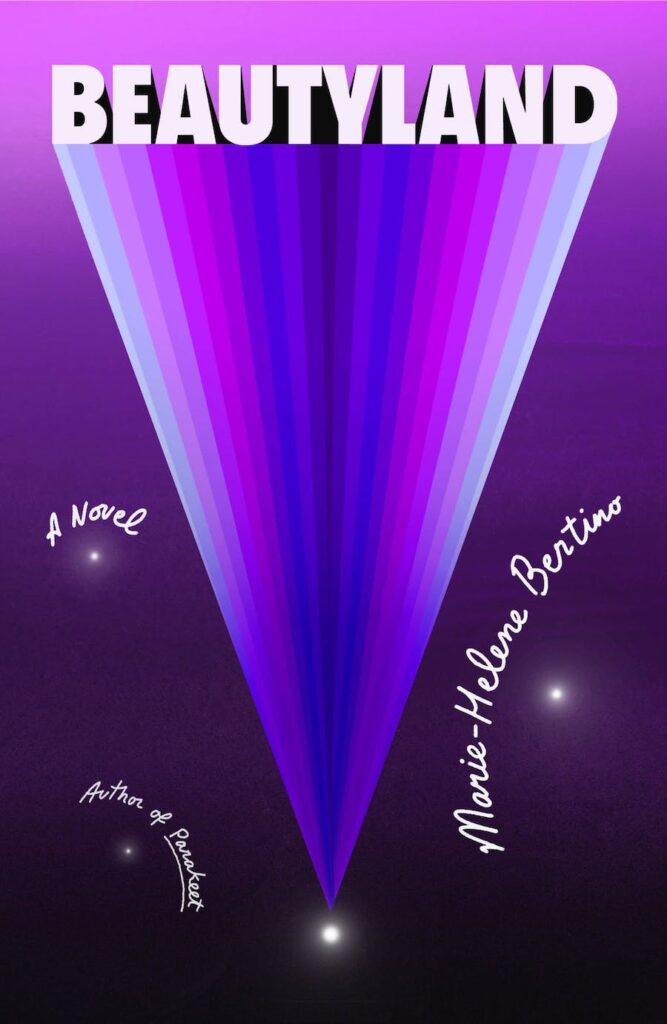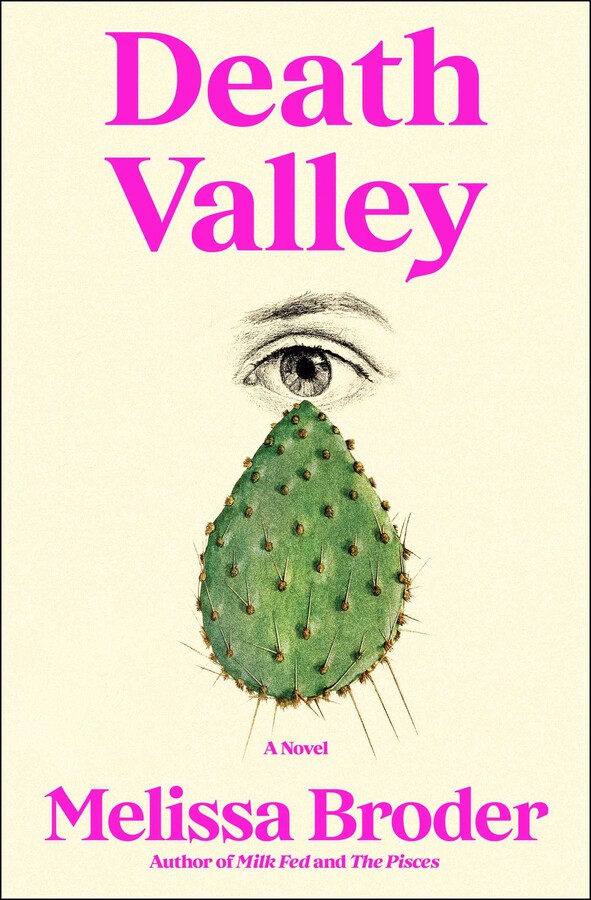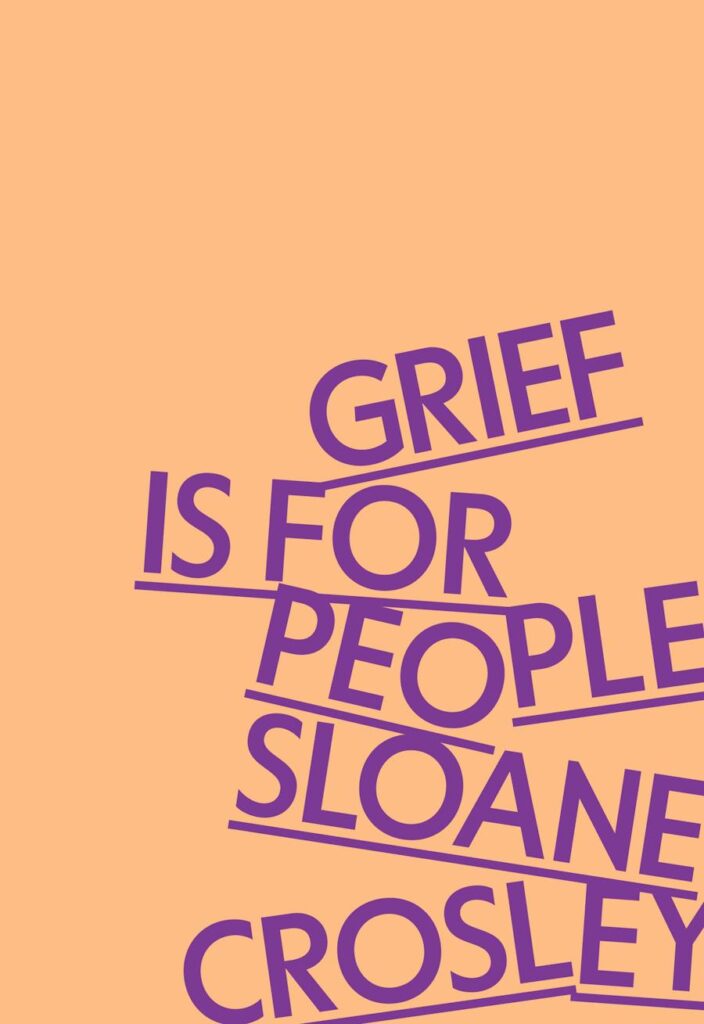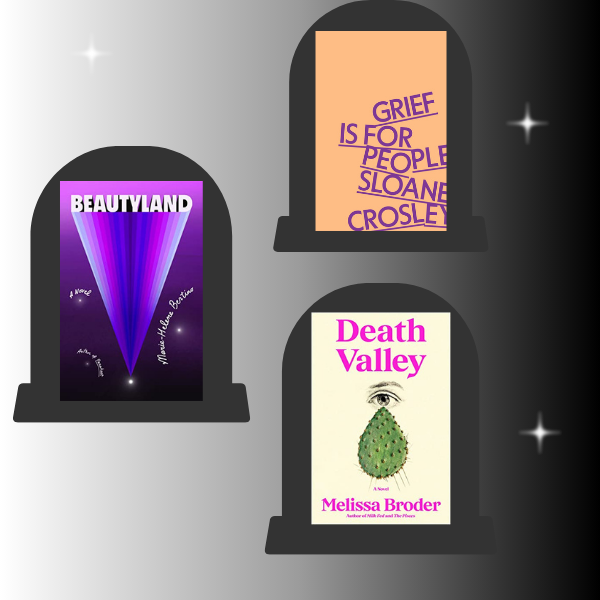This post may include affiliate links, which means we make a small commission on any sales. This commission helps Feminist Book Club pay our contributors, so thanks for supporting small, independent media!
Loss stops us in our tracks. It can alter our perception of time, and interrupt or change the course of our lives. Grief’s psychological effects are well documented. We know its stages and the varied forms they can take, and we give grace to grievers around us. We show up with casseroles and kindness, but we are largely ill-equipped to deal with the aftermath of loss. Regular life resumes too soon after reality has been rearranged. A clutch of new books–Melissa Broder’s Death Valley, Marie-Helene Bertino’s Beautyland, and Sloane Crosley’s Grief is for People–grapple with this jarring effect, giving voice to its strangeness. In these stories, death dissolves boundaries and creates chasms in time, sanity, and selfhood. Each book hinges on a big loss and their narratives plunge us into grief’s alternative realities, where mourning makes way for new worlds.
Beautyland by Marie-Helene Bertino

In Marie-Helene Bertino’s Beautyland, an aromantic, Carl Sagan-obsessed alien named Adina is sent to Earth to observe its viability as a new home for her people, a collective form of consciousness that communicates with her via fax machine. Adina’s eagle eyed-observations of human life begin with her girlhood with a single mother in Philadelphia and continue through adolescence and into an adulthood spent in Queens. The form allows Bertino to wax poetic and offer philosophical and poignant thoughts on existence and humanity. What would seem frivolous, tangential, and overwrought in another book is delightful here. Adina’s reflections are just as often humorous as they are heartbreaking and raw. This is a beautiful book and, if we’ve spoken this year, I’ve probably mentioned it.
The sadness that comes with difference and alienation (and at times just existence) permeates the book from its start but, with the death of a good friend and a beloved dog in quick succession, Beautyland becomes a study in grief. In the same way Adina at once experiences and examines everything that happens to her, she catalogs the symptoms of depression that follow loss. In her depiction of heartbreak and her account of the ways all the small things that once brought her joy have suddenly failed to, so she is so very human and relatable.
“Grief is a bad mirror. It shows you manipulated images of yourself, your will, and the future. It cannot show you how the small work you do will add up to yourself inch by inch,” Adina reflects, noting at once the strangeness of bereavement, and the knowledge that eventually it will end.
Over and over again through her observations, Adina tells us things we have always known but have never quite known how to say.
Death Valley by Melissa Broder

In Melissa Broder’s recent Death Valley, magical thinking gives way to magical realism. In response to what seems to be the impending death of her father, who was injured in a car crash, coupled with the difficulties of living with a partner with a chronic illness, the unnamed narrator embarks on a spiritual journey in the form of a disastrous hike in Death Valley, California.
The narrator, it turns out, is not really much of a hiker. She arrives at the start of the path in a haze with a little bit of water and some items she pilfered from her hotel’s breakfast buffet. Naturally, disaster ensues, along with a semi-religious psychedelic experience inside of a cactus. Much of Death Valley is hallucinatory and surreal as the narrator attempts to find her way back to her car after encountering visions of her father. Throughout the strange events of this book, Broder is still able to convey emotional depth and the complexities of her feelings of anticipatory grief with clarity and her characteristic wit. It’s a strange trip, but a tender one.
I listened to Broder’s podcast at the height of the pandemic. She told the story of her father’s physical decline in realtime, including the way she and her family tried to manage his care while unable to be there with him physically. I identified so much with Broder then. I’d lost my own father a year or so before, after he spent a long time swirling in and out of institutions many states away. Many of Broder’s reflections from that time made their way into Death Valley so I heard them in Broder’s voice, with her dark and self-effacing humor.
Death Valley is a short book, teetering on “slim volume” territory at under 250 pages. Yet, in it, Broder manages to mix so much humor, raw emotion, and psychedelia seamlessly. I would not follow the narrator into the woods if you paid me, but I will follow Broder as a writer wherever she’ll take me.
Grief is For People by Sloane Crosley

In her forthcoming memoir, Grief is for People, Sloane Crosley begins to conflate the death of a close friend and mentor with the theft of her grandmother’s jewelry from her apartment. Crosley’s experience is firmly rooted within reality, while managing to diverge from it.
As Crosley grapples with Russell’s death by suicide, her writing mirrors her thoughts, at times fragmented and disjointed, while also maintaining the humor and clear voice that she is known for. The language is often beautiful and the way she considers the destigmatization of suicide is kind and important.
At times Grief is for People reads like a mystery, except we know from the start what was done and who did it. Crosley looks for traces of Russell everywhere, and also looks back at who he was and how he must have struggled in life. At the same time, as she attempts to track down her stolen jewelry, the plot takes a turn towards Uncut Gems-territory. Crosley finds herself in dangerous places we know she would not go under other circumstances.
Grief is for People culminates in a hallucinatory scene that echoes these other novels. Crosley imagines an empty COVID-era train filled with people, Russell among them. In imagining him, seeking him, and through the act of writing this book about the process of mourning him, Crosley is attempting to answer the question many grievers have.
“How do I keep you buried and keep you with me at the same time,” she writes. “This is the biggest riddle of them all.”
This glaring contradiction–the warring desires to hold on to the memories of someone while also moving forward–is perhaps one source of the strangeness each of these writers is depicting.
A Multiverse of Grief
Grief’s alternative realities in these novels become a way not only to describe a muddled period of mourning but to reckon with and become reconciled with it. Bertino, Broder, and Crosley each use surreal spaces and moments in multiple ways to illustrate and work through the grieving process.
These are just some examples of speculative worlds shaped by loss. I’ve written about Emma Straub’s This Time Tomorrow and the ways its time traveling narrative speaks to the strange timeline of bereavement. These themes also course through Mona Awad’s recent Rouge. After her mother’s death, Belle enters a gothic fairytale horror in the form of a beauty-obsessed cult. Only there is she able to make peace with her mother’s memory.
When life fails to offer closure and space to deal with the complexities, struggles, and contradictions surviving the death of a loved one entails, speculative and surreal literature offers a portal to somewhere else. Instead of trying to make sense of a world changed by the absence of a loved one, these authors made new ones. Together, they form a whole multiverse of grief.


![Here's a non-fiction suggestion for your TBR as Arab American Heritage Month winds down!📖
LAST TO EAT, LAST TO LEARN: My Life in Afghanistan Fighting to Educate Women by Pashtana Durrani and Tamara Bralo has already hit shelves at your local library or bookstore!
"From young Afghani activist and Amnesty International Global Youth Ambassador Pashtana Durrani, a deeply inspiring memoir about the power of learning and the value of educators in their many forms – from teachers, mentors, and role models, to fathers, mothers, and any one of us with the drive to stand against ignorance…"
What other books are you picking up for Arab Heritage month?
Thank you @kensingtonbooks for sending this title our way!
[alt text: the book, Last to Eat, Last to Learn by Pashtana Durrani sits on an orange chair]
#bookmail #bookstack #bookstagram #booksubscription #bookcommunity #bookish #bookclub #feminist #feministbookclub](https://www.feministbookclub.com/wp-content/plugins/instagram-feed/img/placeholder.png)